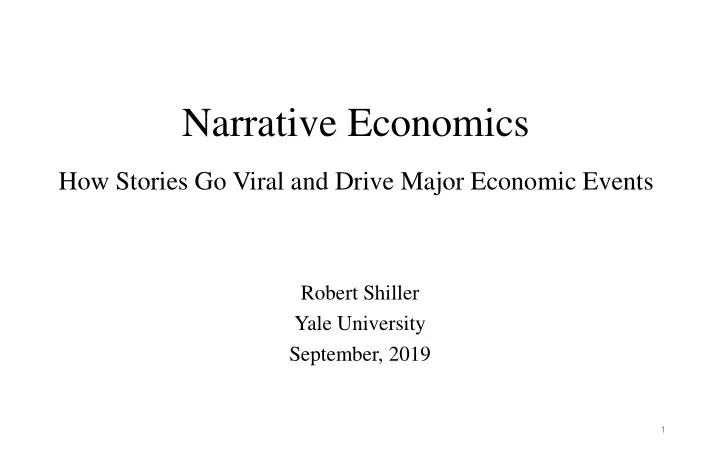

Narrative Economics How Stories Go Viral and Drive Major Economic Events Robert Shiller Yale University September, 2019 1
Outline I. Origins of Narrative Economics II. Medical Epidemiology adapted to Economic Theory III. Nine important perennial economic narratives IV. The Future of Narrative Economics 2
Narrative Economics vs. Behavioral Economics • Behavioral Economics tends to look for stable patterns of human economic behavior grounded in psychology • Narrative economics looks at changes in human economic behavior over time, due to changes in popular narratives, changes in interpretations passed from person to person 3
Narrative Economics Defined • The Palgrave Dictionary of Political Economy (1894) defined Narrative Economics as built on chronological stories of economic events • I define it as the study of popular narratives, trying to understand the role of others’ stories and theories in economic dynamics. • Ideas are conveyed in context of contagious human-interest stories • Constellations of narratives • Confluence of narratives • Attempts to quantify narratives 4
Figure 1: JSTOR Counts of Word “Narrative” as Percent of All Articles, by Discipline 5
An Adventure in Consilience • “Consilience,” word coined by William Whewell, 1794-1866, Trinity College Cambridge • Consilience by E. O. Wilson in 1998 • Wilson: The unity of knowledge among the differing academic disciplines, especially between the sciences and the humanities 6
II. Learning from Medical Epidemiology: Example of Epidemic Curve 7
Narratives about Monetary Standards of Value, Bimetallism and Bitcoin 8
Kermack-McKendrick SIR Disease Epidemic Model, 1927 (Compartmental or SIR Model) • S=fraction of population susceptible, I=fraction of population infected and now contagious, R=fraction of population recovered and now immune, S+I+R=N, c =contagion rate, r =recovery rate 9
Figure 2: Time Paths of S, I, and R in Kermack-McKendrick Model I (0)=.0001%, c =0.5, r =0.05 10
Examples of Controlled Experiments Showing Causality from Narratives to Behavior Marketing (Jennifer Escalas 2007) Journalism (Marcel Machill et al. 2007 ) Education (Scott McQuiggan et al. 2008) Health interventions (M. D. Slater et al. 2003) Philanthropy (Weber et al. 2006) Law (Bell et al. 1985) 11
Constellations of Economic Narratives • Contagion rate of a narrative is related to the presence of other narratives • Narratives about “bimetallism” and William Jennings Bryan and labor unrest were “all that people wanted to talk about” in US in mid 1890s • Narratives about Donald J. Trump and his tweets and rallies are “all that people want to talk about” in US now • “co - epidemic” compartmental models represent this; such models may be more important in economics than in medicine 12
Google Ngrams (Books) Counts for Some Major Macroeconomic Models 1940-2008 13
Compare with Multiplier-Accelerator Model (Samuelson, 1939) 14
From Paul Samuelson, 1939. “Interactions between the Multiplier Analysis and the Principle of Acceleration” Review of Economics and Statistics 15
The Laffer Curve, Arthur Laffer via Jude Wanniski, The Way the World Works , 1978 16
Laffer Curve Counts in News & Newspapers 1950-2019 & Books 1950-2008 17
Google Ngrams Search for Famous Economists 1800-2008 18
III. Nine Important Perennial Economic Narratives 1. Panic versus Confidence 2. Frugality versus Conspicuous Consumption 3. The Gold Standard versus Bimetallism 4. Laborsaving Machines Replace Many Jobs 5. Automation and Artificial Intelligence Replace Almost All Jobs 6. Real Estate Booms and Busts 7. Stock Market Bubbles 8. Boycotts, Profiteers, and Evil Business 9. The Wage-Price Spiral and Evil Labor Unions 19
1. Panic vs. Confidence Narratives 20
Evolving Concepts of Confidence 21
“Great Depression” Counts as Percent of Database each Year 1900-2019 22
2. Frugality vs Conspicuous Consumption Narratives “Billionaires are not defined simply by the size of their holdings but also by the quality of their stuff. There’s no point in being a billionaire if you cannot enjoy those billions. To have the best, you have to know the best. Thinking like a billionaire means recognizing the best and enjoying the best. Of course, it takes practice. Can you confidently name the top five jewelers in the world? ” The Best Cuff Links: The best cuff links are the TRUMP five-star diamond cuff links that Joe Cinque of the Five Star Diamond Awards gave to me. I keep some on hand to give to people as gifts, and they are great-looking. I also wear solid gold cuff links from time to time, but I have to say, I prefer Joe’s TRUMP cuff links. 23
Frugality during Great Depression • DARE TO BE POOR! . . . In other words, can we not use this period to get rid of a little snobbery and bunkum and live lives dictated by our own tastes instead of our neighbours’ supposed notions of ‘what is done’? With so much to do, and a world so rich in experience, must we shut ourselves up into little genteel compartments in which we all adopt the same arbitrary standards, wear the same things, eat the same things, and produce the same sad monotony of ‘appearances’? Winifred Holtby, columnist for Manchester Guardian, 1931 24
American Dream 25
3. Monetary Standards • Coin’s Financial School , William Hope Harvey, 1894 • Featured a “boy” lecturing to financiers about the gold standard and bimetallism • Sold a million copies 26
4. Technological Unemployment 27
Albert Einstein on Technological Unemployment, 1933 • According to my conviction it cannot be doubted that the severe economic depression is to be traced back for the most part to internal economic causes; the improvement in the apparatus of production through technical invention and organization has decreased the need for human labor, and thereby caused the elimination of a part of labor from the economic circuit, and thereby caused a progressive decrease in the purchasing power of the consumers 28
• New data availability — digitized text and speech • New forms for economic theory IV. The Future of Narrative Economics • Collecting better information on popular economic narratives should start now 29
Recommend
More recommend